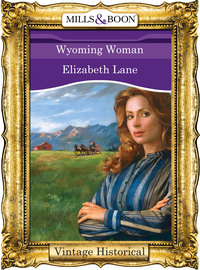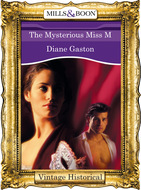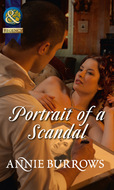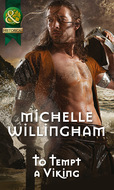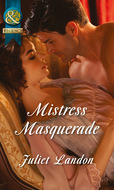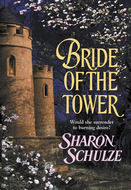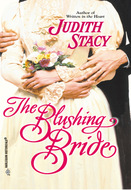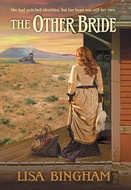Raamatut ei saa failina alla laadida, kuid seda saab lugeda meie rakenduses või veebis.
Loe raamatut: «Wyoming Woman»
His gaze sent an oddly sensual quiver through every nerve in her body.
“You’ve no right to be running sheep in this part of the state,” she said. “This is cattle country.”
A dangerous smile tugged at a corner of his mouth, underscored by the dance of lightning in the dark sky behind him. “This is open range. And only a cattleman’s woman would talk like that.”
Rachel had to raise her voice to be heard above the echoing thunder. “A cattleman’s daughter!” she snapped. “And if you so much as lay a finger on me—”
His cold, bitter laughter interrupted her. “I’m aware of who your father is, Miss Tolliver. I’ve even heard a few tales about his spoiled, redheaded hellion of a daughter. Believe me, I’d just as soon pick up a live rattlesnake as lay a finger or anything else on you…!”
Acclaim for Elizabeth Lane’s latest books
Bride on the Run
“Enjoyable and satisfying all around, Bride on the Run is an excellent Western romance you won’t want to miss!”
—Romance Reviews Today (romrevtoday.com)
Shawnee Bride
“A fascinating, realistic story.”
—Rendezvous
Apache Fire
“Enemies, lovers, raw passion, taut sexual tension, murder and revenge—Indian romance fans are in for a treat with Elizabeth Lane’s sizzling tale of forbidden love that will hook you until the last moment.”
—Romantic Times
Wyoming Woman
Elizabeth Lane

MILLS & BOON
Before you start reading, why not sign up?
Thank you for downloading this Mills & Boon book. If you want to hear about exclusive discounts, special offers and competitions, sign up to our email newsletter today!
Or simply visit
Mills & Boon emails are completely free to receive and you can unsubscribe at any time via the link in any email we send you.
For Barbara
Contents
Chapter One
Chapter Two
Chapter Three
Chapter Four
Chapter Five
Chapter Six
Chapter Seven
Chapter Eight
Chapter Nine
Chapter Ten
Chapter Eleven
Chapter Twelve
Chapter Thirteen
Chapter Fourteen
Chapter Fifteen
Chapter Sixteen
Chapter Seventeen
Epilogue
Chapter One
Wyoming, May 24, 1901
T he wagon road that cut south from Sheridan was little more than a rutted cow path meandering between clumps of sage and rabbit brush, skirting boulders and dipping through gullies as it wound its way toward the horizon. Its washboard surface jarred every bone in Rachel Tolliver’s body as she balanced on the seat of the buggy she had rented at the railroad depot. Her gloved hands gripped the leather reins as she struggled to slow the headstrong mule. Her trunks, bags and hat boxes bounced and rattled on the floorboards as every bump threatened to send them flying into the sagebrush.
She had been in the East too long, Rachel thought. Three years ago, she would not have given the mule, the rickety buggy or the dusty, rutted road a second thought. But her time at art school in Philadelphia had spoiled her. She had become accustomed to paved roads and well-mannered horses, and had even ridden in an automobile. Wyoming was a wild, rough, different world. But it was home, and despite the bumpy ride, her heart sang with happiness.
Slamming the wheel brake forward, she swerved to miss a jutting boulder. The buggy lurched like a drunkard, almost throwing her across the patched leather seat, but the mule, who had evidently learned that a brisk pace meant a swift return to the barn, did not even slow its careening trot.
Using her legs to grip the seat, Rachel repinned her chic straw hat atop her upswept, red-gold hair and braced herself for the next washed-out section of road. She was beginning to wish she’d wired her family at the ranch and let them know she was coming a week early. They could have met the afternoon train and given her a pleasant ride home in the big, lumbering wagon they used to haul supplies. Instead she had decided to surprise them.
What in heaven’s name had she been thinking?
Rachel had traveled this road countless times by horse and wagon, and she knew every rutted, bumpy, wandering foot of it. Just ahead lay the long, steep hill that marked the halfway point between Sheridan and the sprawling cattle ranch where her family lived. Once she made it over the top, the most tedious part of the trip would be over. She would be able to fly down the switchbacks on the other side, then enjoy the level stretch that cut across the open plain.
She could just imagine her family’s reaction when she drove the buggy in through the ranch gate. Her mother would be overjoyed to see her but would fuss over the fact that she’d made the long drive alone. Her half Shoshone father, a loving but undemonstrative man, would give her a restrained hug, ask her about school and return to his chores. Her twin brothers, Jacob and Josh, would be clamoring to see the presents she’d brought them—a collection of the silly little mechanical toys they loved and had never out grown, even in their late teens. They would be racing the small wind-up automobiles up and down the upstairs hallway, laughing and whooping like young savages. The sound of that laughter, Rachel thought, would be music to her ears.
Three years at art school had fulfilled a lifelong wish for her, but time had taught her that she would never be content in the city. Her heart belonged to the windswept plains and towering peaks of Wyoming, and she wanted nothing more than to spend the rest of her life here.
A prairie chicken exploded from the roadside as Rachel settled herself for the long climb up the hill. As the road wound upward, the mule, which had been tearing along like a juggernaut, gradually slowed its pace to a plodding walk. To encourage the animal, Rachel slapped its haunches with the long reins and began to sing at the top of her lungs.
“In a cavern, in a canyon, excavating for a mine, dwelt a miner, forty-niner and his daughter, Clementine…”
Despite her encouragement, she could feel the mule begin to flag as they neared the crest. Slapping the reins down hard on its dusty rump, Rachel sang louder.
“Oh, my darling, oh, my darling, oh, my darling Clementine, thou art lost and gone forever, dreadful sorry, Clementine.”
The buggy crowned the hill and began to level out. Relieved of the buggy’s heavy drag, the mule broke into a determined trot once more. Suddenly Rachel found herself on the downward side, going fast. Too fast.
A knot of fear jerked tight in her stomach as she thrust the brake forward. There was a grinding sound, then the sickening sense of nothing happening. The brake was gone, and the mule, with the careening buggy pushing from behind, was not going to slow down.
Sawing helplessly on the reins, she gasped as the buggy swung around the first sharp curve with a force that slammed her across the seat and almost tipped the vehicle onto its side. Clawing her way upright, Rachel got a grip on the seat just in time for the next switchback. The buggy was rolling downhill at break-neck speed, but the steepest part of the road was behind her now. If she could hold on for the two remaining turns, the slope would level out and the buggy would slow down on its own.
Clenching her teeth, she braced herself for the next hairpin turn. The wheels plowed sideways into the loose gravel with a force that threatened to snap the axle, but, miraculously, the buggy held the road.
Hat gone, hair flying, Rachel gripped the reins and braced her feet for the final curve. It would be all right, she told herself. The grade was already leveling off, and her speed was slowing. She and the accursed mule were going to make it. Two hours from now she would be home, regaling her family with the story of her wild ride.
She was in position for the turn when the wheels hit a sudden dip. Launched upward, the buggy became airborne for a heart-stopping instant. Then it hit the road with a jolt that Rachel felt to the roots of her teeth. The impact lifted her inches off the seat, but she clung doggedly to the reins. This wasn’t her day to die! She had too much living left to do. Too many pictures to paint, too many horses to break, cattle to brand and people to love! She’d be damned if she was going to let go now!
Hanging on with every last ounce of strength, she wrestled the buggy around the last curve. The vehicle rocked dangerously, then, counterbalanced by Rachel’s own weight, settled back onto four wheels. Rachel felt herself begin to breathe again. She had made it down the hill in one piece. She was going to be all right.
Then she saw them.
Sheep.
They spread like a lumpy white flood across the road, a scant seventy yards ahead of her. There were hundreds of them—ewes and rams, plump with un-shorn wool, and tiny lambs scampering among their legs. She could hear their piercing bleats, hear the clanging of their bells as they ambled along with their noses in the dust, so bland and stupid that they didn’t even have enough sense to get out of her way.
She was going to plow right into the herd.
Frantic, Rachel jerked the reins and shouted at the top of her lungs, but the sound that emerged from her mouth was lost amid the bleating of the sheep. The brainless creatures did not even raise their heads. What in heaven’s name were they doing here anyway? Where was their herder?
She flung her weight backward in the desperate hope that the mule would stop. But the buggy kept moving, like a reaper headed into a stand of wheat. It would mow down the sheep, leaving a swath of dead and injured animals until the resistance of their bodies finally stopped its motion.
There was only one thing she could do, and, with time ticking down to a split second, Rachel did it.
Wrenching the reins to the right, she swerved off the road. The mule was ripping along in a blind panic now. There was no time to choose a good spot or even to look where she was going. The buggy lurched over clumps of sage, bounded off a saddle-sized rock and careened down the side of a wash. The mule screamed and pitched onto its side as the buggy rolled, scattering trunks and boxes and throwing Rachel forward, over the dash. Like a rag doll tossed by an uncaring child, she tumbled onto the sand, moaned and lay still.
Luke Vincente heard his dogs barking as he came over the rise. The sound put him on instant alert. The two Scotch border collies tended to work the sheep quietly, uttering soft little yips as they worried the flanks of the stragglers. The clamor he heard now could have only one meaning—something was wrong.
Luke’s eyes scanned the herd as he urged the rangy buckskin gelding down the slope. The sheep were ambling along at their usual pace, showing no sign that anything was amiss. But Luke could not see either of the dogs. Maybe they’d cornered a badger or come across a den of coyote pups. Or maybe they’d even found a rattler. A snake-bit dog was the last thing he wanted.
A shallow wash, etched by spring floods, cut down the side of the hill and zigzagged across the flat. That would be where the dogs were, Luke calculated. Otherwise he’d be able to see them. Anxious now, he spurred the buckskin to a trot.
Luke had come to Wyoming seeking the peace and solitude of open spaces. But he’d had enough trouble here to last him the rest of his life, especially in the past few weeks. Just this morning Luke had found three of his best purebred merino ewes shot dead around a watering hole. The cattlemen who’d done it hadn’t even bothered to hide their tracks. Why should they, when the law turned a blind eye to any crime committed against people who raised sheep?
But that wasn’t the worst of it. Three nights ago, his best herder, an old Spaniard who wouldn’t hurt a fly, had narrowly escaped death when masked raiders had torched the sheep wagon where he slept. When the old man had stumbled outside, the masked men had beaten him to a bloody pulp and left him for dead.
Luke had no doubt that the raiders had come from neighboring ranches whose owners wanted him, his sheep and his herders off the open range. The fact that they had every right to be there only made the cattlemen more determined to drive him off.
Luke had had a bellyful of trouble over the past week. He could only hope he wasn’t about to stumble into more.
The barking grew louder as he neared the wash. Now, through the tall sage, he could see a stark, black shape jutting above the rim. Luke swore under his breath as he realized what it was. What kind of damned fool would drive a buggy fast enough to run it off the road in this country?
His heart sank as he realized he was about to find out.
Luke swung out of the saddle and looped the buckskin’s reins over a dead cedar bush. As he strode down into the wash the dogs bounded out from behind the buggy to greet him, their tongues lolling, their feathery black-and-white tails wagging, as if to say, “Look what we’ve found!”
With a low whistle and a swift hand sign that the dogs had been trained to obey, Luke sent them back to tend the herd. As they frisked up the slope of the wash, he turned and walked cautiously toward the buggy.
Its front wheels were buried axle deep in sand. One rear wheel, tipped clear of the ground, was still spinning. Either the wind was playing tricks, or the accident had only just happened.
He looked for a horse or mule, but found only the broken traces and a set of large, shod hoofprints leading up the side of the wash. Judging from the trail it had left, the animal wasn’t badly hurt. Luke hoped the driver of the buggy had been as fortunate, but as he gazed at the wreckage, he knew that wasn’t likely.
The buggy had been going fast when it shot over the edge of the wash, he surmised. Fast enough, most likely, to throw the driver over the dash and break his fool neck, or maybe smash his head on a rock. Either way, he wasn’t going to be a pretty sight.
Luke was a half-dozen paces from the buggy when a flicker of movement beyond the far side of it caught his eye. Something was blowing in the wind—something white and lacy that looked like a petticoat. And he could see now that the debris scattered around the wreck included two hat boxes and a trunk that had burst open on impact and bounced down the wash, spilling a trail of frilly undergarments along its sandy bed.
Luke swore out loud. It was bad enough that the driver had endangered himself. That he’d been driving like a lunatic with a woman aboard was more than stupid. It was downright criminal.
As he sprinted around the buggy, Luke caught sight of crumpled petticoats and a fluttering blue skirt. For an instant he hoped it might be a heap of clothing. But the sleek little high-button boots thrusting from beneath a ruffle of ecru lace told him otherwise.
She lay on her back, amber curls spilling like a tangled skein of silk embroidery floss over the rocky gray sand. Her eyes were closed, the lashes like the soft, dark vane of a quail’s feather against ivory cheeks. Her features were as perfect as a doll’s, her periwinkle-blue traveling suit so well-tailored and immaculate that she looked as if she had just been lifted out of a tissue-lined box before being flung onto the ground.
She was somebody’s rich, spoiled baby, that was for sure. The same kind of rich, spoiled baby who’d cost him four precious years of his life.
Her breasts were small and taut beneath the snug-fitting jacket. Their even rise and fall confirmed that she was breathing. A touch of his fingertip to her warm throat told Luke her pulse was strong and steady. His first impulse was to lift her head and try to get some water down her. But she could have fractured bones or even a broken neck, he cautioned himself. It would be best not to move her until she could tell him what was hurting. He would give her a few minutes to awaken on her own. Meanwhile, he needed to find out what had happened to the driver.
Luke glanced around and saw no sign of another person, nor could he spot any tracks leading away from the wreckage. He scanned the buggy and the area around it, then, rising to his feet, made a hasty search of the surrounding rocks and brush. Unless the driver had been snatched directly into heaven, there was only one conclusion to be made. The damn-fool woman had been driving the buggy herself.
For the space of a long breath, Luke stood gazing at the thick black clouds that were spilling over the Big Horn Mountains to the west. The afternoon breeze smelled of rain—a welcome sign. Here on the open range where sheep and cattle competed for every bite of grass, water was more precious than gold. But mountain storms could also trigger flash floods that sent mud and water boiling down washes just like this one, drowning unwary stock and burying anything that couldn’t be swept away.
As if echoing his thoughts, sheet lightning flashed above the peaks, followed by the rumbling boom of thunder. This wash was no place to be stuck in a storm, especially with an unconscious female on his hands. Injured or not, he needed to get her to safe ground.
He was turning back toward her when something caught his eye—a glittering flash of blue, lodged behind one half-buried front wheel. Drawn by curiosity, he dropped to a crouch and worked the object free. It was a small, beaded reticule, fashioned of the same fabric as the periwinkle-blue traveling suit. Luke glared down at it, where it lay clutched in his big, callused hands. The little piece of frippery had probably cost enough to feed a starving family for a month. And this pampered, pretty creature probably hadn’t given the money a second’s thought.
Only as he was about to toss it away in disgust did it occur to him that he should open the reticule and look inside. He might find something with a name or address on it—a letter, a calling card, even an embroidered handkerchief that might tell him her name or furnish some clue about who to contact, should she need more help than he could give her.
His fingers fumbled with the small, ornate clasp. Frustrated by its intricacy, Luke cursed under his breath. For two cents he would draw his knife and cut the damned thing open like a—
“Hold it right there, sheep man!”
The taut little voice raked Luke’s senses. “Drop the bag, raise your hands and turn around slowly. No tricks, or I’ll blow you to kingdom come!”
Luke’s rifle was on the horse and, in any case, he knew better than to make a rash move before sizing up the situation. Cursing himself for getting into this predicament, he dropped the reticule, raised his hands and slowly turned around.
The woman lay propped on one elbow. Her striking blue-green eyes blazed with raw fury. Her free hand gripped a tiny but evil-looking derringer that was pointed straight at Luke’s chest.
Chapter Two
R achel gripped the miniature one-shot pistol she’d taken from her pocket, willing her fingers not to tremble. Her temples were throbbing, and her left shoulder felt as if it had been kicked by a mule, but there was nothing missing from her memory. The recollection of swerving off the road to miss the sheep, then careening into the wash, was crystal-clear in her mind—as clear as the image of the bastard she’d just caught trying to rob her.
“Are you sure you know how to use that little toy, lady?” He spoke with a hint of southern drawl, his voice as deep and rich as blackstrap molasses.
“You don’t want to find out the hard way.” She glared up at him, feeling small and helpless despite the cold weight of the gun in her hand. The derringer was cocked and loaded, the man close enough to provide an easy target. But something in the lithe, easy way he stood, hands relaxed, dark eyes narrowed like a wolf’s, whispered danger. Fear crept upward into her throat—a fear that she masked with spitting fury.
“Are these your sheep?” she sputtered. She took his silence for a yes. “I could have been killed! Look at this buggy! It’s ruined, and the mule’s run off to heaven knows where! What were those fool animals doing in the road anyway? If I hadn’t swerved, I’d have crashed right into them!”
“The last I heard, there was no law against herding stock across a road,” he replied icily. “Sheep and cattle have the right-of-way in this country. If you were going too fast to make the turn, that’s nobody’s fault but your own. Now put that silly little gun away before somebody gets hurt.”
“So you can finish going through my things? Don’t waste your time. I don’t have enough money in that bag to be worth your trouble.”
His lip curled in a sneer of contempt, and Rachel sensed at once that she had said the wrong thing. The stranger’s fierce pride showed in the erect stance of his lean, muscular body, the set of his aquiline head and the unruly spill of blue-black hair over his brow. His face was more compelling than handsome, with features that could have been hewn from raw granite. His dark, hooded eyes were as sharp and alert as a hawk’s. He was a disturbing man, an unsettling man whose gaze sent an oddly sensual quiver through every nerve in her body. But Rachel’s instincts told her he was too proud to steal, especially from a woman.
All the same, she would be foolish to lower her guard. Gripping the derringer’s tiny stock, she glared up at him. From beyond the rim of the wash, she could hear the brassy jangle of sheep’s bells and the bleating of the ewes and lambs. “You’ve no right to be running sheep in this part of the state,” she said. “This is cattle country.”
A dangerous smile tugged at a corner of his mouth, underscored by the dance of lightning in the dark sky behind him. “This is open range. And only a cattleman’s woman would talk like that.”
Rachel had to raise her voice to be heard above the echoing thunder. “A cattleman’s daughter!” she snapped, throwing discretion to the winds. “My name is Rachel Tolliver. My father owns the biggest cattle ranch in this county. And if you so much as lay a finger on me—”
His laughter interrupted her—cold, bitter laughter that did nothing to settle her edginess. “I’m aware of who your father is, Miss Tolliver. I’ve even heard a few tales about his spoiled, redheaded hellion of a daughter. Believe me, I’d just as soon pick up a live rattlesnake as lay a finger or anything else on you. Now, if you don’t mind putting that gun away, my arms are getting tired.”
Rachel hesitated. She’d grown up hearing that sheep men were worse than bandits. Their wretched, woolly animals fouled the water holes and destroyed good range land by nipping off every blade of grass so short that there was nothing left for the cattle to eat. Sheepherders who worked for wages tended to be Mexicans or Spanish Basques—quaint little men who lived in their hutlike wagons and kept to themselves. But this tall, insolent stranger was clearly not of that stripe.
“What do you plan to do with me, Rachel Tolliver?” he taunted her. “Shoot me? Send me packing? Either way, you’ll be out here alone with a storm coming and your buggy wrecked in a wash. Like it or not, I’m the only help you’ve got. You’ve no choice except to trust me.”
“I’d just as soon trust a coyote as a sheep man!” Rachel retorted, but she was beginning to see that he was right. Like it or not, unless she wanted to walk twenty miles in the rain—
The rest of her thoughts took flight at the sound of a low growl behind her. She glanced back over her shoulder to see a middle-sized dog with a shaggy black-and-white coat crouched a half-dozen paces away. Its sharp yellow fangs were bared in a threatening snarl.
“Oh—” Caught off guard, Rachel was unprepared for what happened next. With the speed of a pouncing cat, the stranger was on her. His strong hands caught her wrist and wrenched the derringer out of her grasp. The next thing she knew, she was lying flat on her back, staring up at him where he stood over her. From the ground, with thunderheads rolling in behind him, he looked as big as a mountain.
Scowling, he released the hammer and slipped the miniature pistol into his vest. Rachel was bracing for a fight when he reached down, seized her wrists and jerked her roughly to her feet. Frightened and angry, she tried to twist away from him. He released her so abruptly that she lost her balance, stumbled backward and slammed against the side of the buggy.
“Your call, Miss Rachel Tolliver,” he growled, making no further move to touch her. “You can ask for my help, or I can ride off and leave you here alone with your spilled baggage. Either way, it’s up to you. I don’t give a damn what you decide.”
He glanced down at the dog, which had moved to stand protectively at his side. At a slight motion of its master’s hand and a spoken command that was no more than a whisper, the animal wheeled and raced up the side of the wash in the direction of the sheep.
Rachel flinched as the first raindrop splashed against the end of her nose. With a clatter that began like pearls falling from a broken string and grew to a solid rush of pelting rain, the storm swept down from the mountains to engulf everything in its path. Rain peppered the sand in the wash and blasted the dust from the buggy’s shiny black body. Rachel felt its weight soaking her hair, its wet chill penetrating layers of clothing to reach her skin.
“Well, which will it be?” Water streamed off the sheep man’s hair and beaded on his eyebrows, but he had not moved from where he stood. “Make up your mind, Miss Tolliver. I haven’t got all day.”
“All right. Yes, I need your help!” Rachel had lived too long in this country not to know what would happen to anything that remained in the wash. “Please! Hurry! The important things—my paints and canvases—are in the back! And we really need to get the buggy out. Otherwise my father will have to pay Finnegan’s Livery for the loss of it.”
“There’s a rope on my saddle. I’ll get the horse.” He turned away and strode up the side of the wash, his boots leaving muddy gouges that swiftly filled with water and crumbled away. Rachel watched his tall figure disappear through the gray curtain of rain. Then, with no more time to spare, she turned and raced to gather her scattered, soaking possessions.
Luke left her scrambling for her things and strode back through the brush to get the horse. Morgan Tolliver’s daughter. He cursed under his breath. For two cents he would ride away and leave the little hellcat to the storm. He owed no favors to cattle ranchers and their kin, nor did he expect any in return. All he really wanted was to be left alone.
The buckskin was waiting beside the cedar bush. It nickered and shook its rain-soaked hide as he freed its bridle from the dead branch. A quick glance up the slope confirmed that Mick and Shep, the two collies, were doing their job, herding the sheep into a tight circle where the lambs would be protected from the worst of the storm. The precious animals would be safe enough until he could pull the buggy out of the wash and, he hoped to heaven, get the snooty Miss Tolliver on her way. She was a wild beauty, with those sea-colored eyes, that untamed mop of red-gold curls and a figure that would tempt the devil himself. But a cattleman’s daughter… Luke shook his head and swore as he led the horse toward the wash. Her kind of trouble was the last thing he needed.
The Tolliver Ranch was the biggest spread in the county, and likely one of the biggest in the state of Wyoming. A remote corner of it butted onto Luke’s modest parcel of land at the foot of the Big Horn Mountains. Luke had only a passing acquaintance with the ranch’s owner. But a cattleman was a cattleman, and if there was anything the cattle ranchers hated more than sheep it was the men who allowed them to graze on public land.
Had Morgan Tolliver and his twin sons been among the raiders that had nearly burned poor old Miguel alive in his wagon and then beat him sense less? Had a Tolliver gun shot the three purebred ewes that were the best of Luke’s herd—the herd he had labored for five miserable, backbreaking years in the Rock Springs coal mines to buy?
The answer to those questions made no difference. Luke had nothing that would stand as proof against the Tollivers and their kind. Even if he were to find such proof, there’d be nothing he could do except sell out and run for his life. And he would die, Luke swore, before he let the bastards drive him off his land.
Through the pelting rain, he could see the edge of the wash and the water-soaked heap that Morgan Tolliver’s daughter had made of her rescued baggage. Hauling the buggy out of the wash would be a tough job. And even if they could salvage it, how was she going to get home with no mule to pull it? He would be stuck with her.
For the space of a breath, Luke hesitated. Why should he be helping the woman at all? Rachel Tolliver had held a gun on him, accused him of thievery and, in general, behaved like the spoiled brat she was. It would serve her right, maybe even teach her a lesson, if he rode off and left her on her own. Surely she would not be alone for long. Her family was bound to miss her and come looking for her.
But no—the image of Rachel shivering in the rain like a lost puppy was more than his conscience could bear. It had been a long time since he’d considered himself a gentleman, but he had not sunk so far that he would ride away and leave a woman in a dangerous situation.
He found her hunkered beside the buggy, digging around one mired wheel with a twisted sage root. Her hair hung around her face in dripping, curly strings, and her once-elegant blue suit was soaked with muddy water. She looked up in ill-disguised relief as Luke slogged his way down the bank with a coil of rope.
Tasuta katkend on lõppenud.
